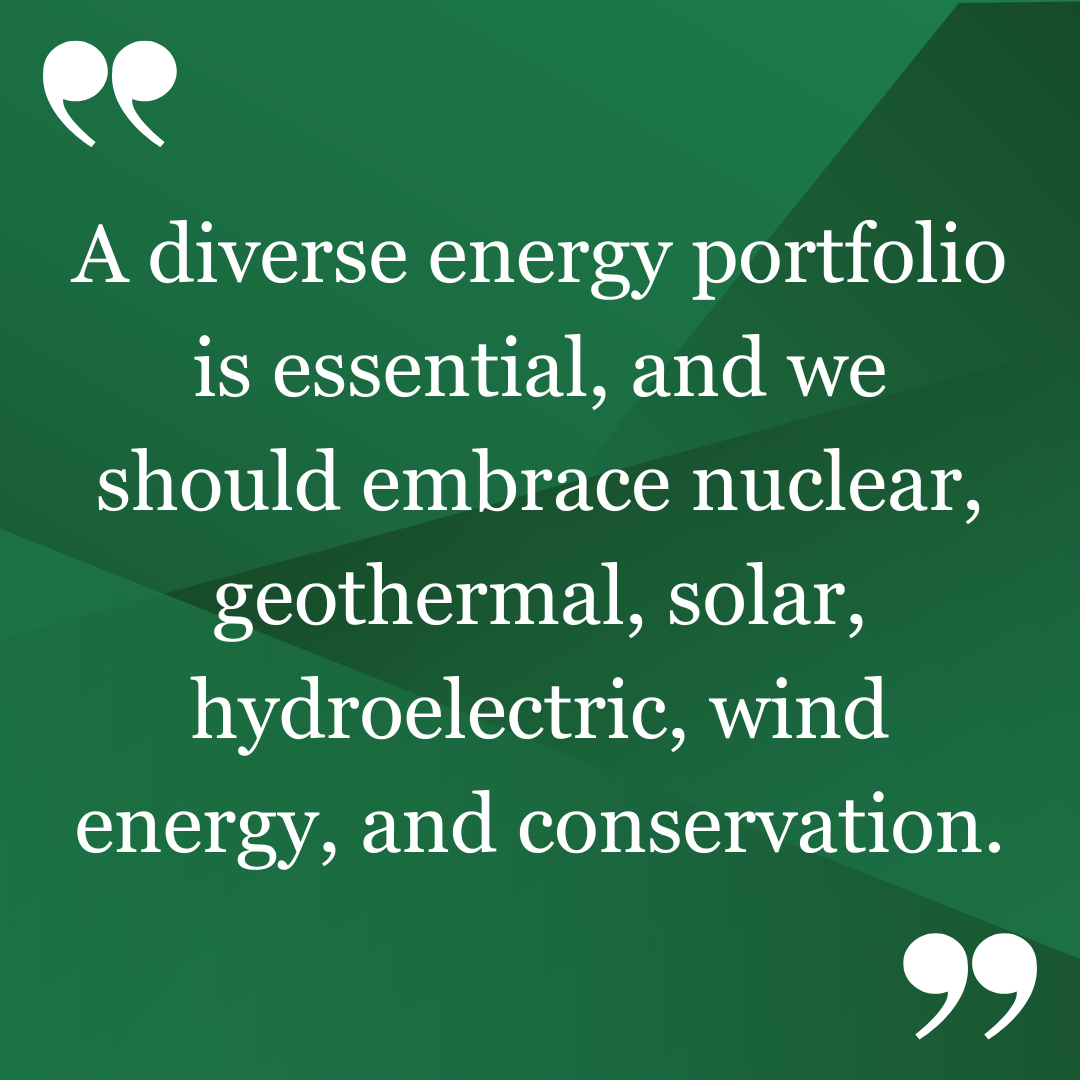Your voice matters. Check your Vermont Voter Registration Today.
Your voice matters. Check your Vermont Voter Registration Today.
ENERGY
POLICY

I believe in empowering market and innovation rather than imposing heavy-handed regulations. A diverse energy portfolio is essential, and we should embrace nuclear, geothermal, solar, hydroelectric, wind energy, and conservation. Nuclear energy has faced significant opposition in the United States. However, current energy costs, the climate crisis, and new technologies are shifting attitudes. According to the Nuclear Energy Institute (NEI.org), new reactors and technologies promise a future of clean, reliable energy. Beyond electricity generation, these advancements will provide benefits such as water desalination, process heat, alternative fuel generation, and off-grid power solutions. They offer reliable and clean electricity for remote areas and immediate power in disaster scenarios. Innovative reactor designs will also allow for the recovery and recycling of elements in used nuclear fuel, enhancing energy efficiency. Geothermal energy harnesses thermal energy from the Earth’s crust. It offers a consistent and sustainable energy supply without excessive government intervention. Solar, hydroelectric, and wind energy convert natural resources like sunlight, water, and wind into electricity. These renewable sources are essential for reducing our carbon footprint and promoting energy independence. We must continually explore and develop new technologies across all energy sectors, including fossil fuels. While fossil fuels contribute to pollution and greenhouse gas emissions, they remain a reliable energy source. We should not limit discoveries but instead, encourage innovation through market incentives rather than restrictive policies. By embracing a comprehensive energy strategy driven by market forces and innovation, Congress can address climate change while ensuring energy security, economic stability, and individual freedom.
When discussing energy policy that includes nuclear, geothermal, and renewable sources, it’s important to balance environmental concerns, economic factors, and energy security. Here’s a broad policy position that incorporates these elements:
Nuclear Energy
Promotion of Advanced Nuclear Technologies: Support the development and deployment of advanced nuclear reactors, such as small modular reactors (SMRs) and next-generation reactors, which offer enhanced safety, efficiency, and reduced waste.
Regulation and Safety: Ensure robust regulatory frameworks that prioritize safety, waste management, and public health.
Invest in research to improve waste disposal methods and long-term sustainability.
Public Engagement: Foster public dialogue to address concerns and build trust in nuclear energy’s role in a low-carbon future.
Geothermal Energy
Incentives and Investment: Provide financial incentives, such as tax credits and grants, to stimulate investment in geothermal energy projects, particularly in regions with high geothermal potential.
Research and Development: Support research into enhanced geothermal systems (EGS) and other innovative technologies to expand geothermal energy’s applicability and efficiency.
Infrastructure Development: Invest in infrastructure to facilitate the integration of geothermal energy into the grid and support local geothermal heating and cooling applications.
Renewable Resources
Diversified Portfolio: Promote a diverse mix of renewable energy sources, including solar, wind, hydro, and biomass, to enhance energy security and resilience.
Grid Modernization: Invest in modernizing the electricity grid to accommodate and optimize the integration of intermittent renewable sources. Support energy storage solutions to address supply variability.
Research and Innovation: Fund research to improve renewable technologies, reduce costs, and increase efficiency. Support breakthrough innovations that can accelerate the transition to clean energy.
Conservation & Efficiency
Energy Efficiency Standards: Implement and enforce stringent energy efficiency standards for buildings, appliances, and industrial processes to reduce energy consumption and greenhouse gas emissions.
Conservation Programs: Support conservation programs that protect natural habitats, reduce environmental impact, and promote sustainable land use practices.
Public Awareness and Education: Launch initiatives to educate the public on the importance of energy conservation and sustainable practices, encouraging behavioral changes that support climate goals.
Economic & Environmental Balance
Just Transition: Ensure that the transition to cleaner energy sources is equitable and includes support for workers and communities affected by the shift away from fossil fuels.
Carbon Pricing: Consider implementing carbon pricing mechanisms to internalize the environmental costs of energy production and incentivize the reduction of greenhouse gas emissions.
Energy Security & Independence
Diversified Energy Portfolio: Maintain a diversified energy mix to enhance energy security and reduce dependence on any single source or import.
Resilience Planning: Develop strategies to ensure the resilience of energy infrastructure against natural disasters, cyber threats, and other disruptions.
US Refining Capacity
The current capacity of refining oil is roughly 18.4 MBD (Million Barrels/Day) and is at full capacity. The US has lost three out of 132 over the last few years. For security, increased growth, and obsolescence, the US needs more costly refineries.
Integrated Approach
Holistic Policy Framework: Develop an integrated policy framework that balances the use of nuclear, geothermal, and renewable energy sources with conservation efforts. Ensure that all aspects are aligned with broader climate goals and sustainability targets.
Collaboration: Foster collaboration between governments, private sector, and research institutions to leverage expertise, share best practices, and drive innovation in all areas of climate action.
Equity and Accessibility: Ensure that climate policies are equitable and provide support for communities that may face disproportionate impacts from climate change or energy transitions.
This approach recognizes the unique contributions of each energy source and strategy while emphasizing the need for a coordinated effort to address climate change effectively.
Contact Info
Phone: 860-563-8292
Email: matt@matthillforsenate.org
Address: Box 377 W. Burke, VT 05871
